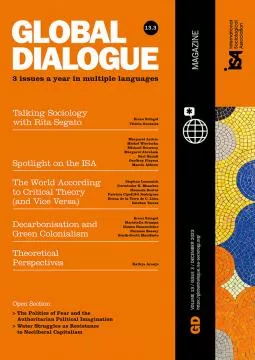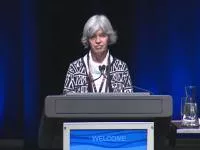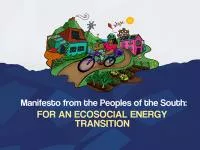GD 13.3 - December 2023

Global Dialogue is available in multiple languages!
Select the language to download the issue.
Editors:
Breno Bringel.
Assistant Editors:
Vitória Gonzalez, Carolina Vestena.
Associate Editor:
Christopher Evans.
Managing Editors:
Lola Busuttil, August Bagà.
Consultants:
Michael Burawoy, Brigitte Aulenbacher, Klaus Dörre.
Consulting Editors:
Sari Hanafi, Geoffrey Pleyers, Filomin Gutierrez, Eloísa Martín, Sawako Shirahase, Izabela Barlinska, Tova Benski, Chih-Jou Jay Chen, Jan Fritz, Koichi Hasegawa, Hiroshi Ishida, Grace Khunou, Allison Loconto, Susan McDaniel, Elina Oinas, Laura Oso Casas, Bandana Purkayastha, Rhoda Reddock, Mounir Saidani, Ayse Saktanber, Celi Scalon, Nazanin Shahrokni.
REGIONAL EDITORS
Arab World: (Lebanon) Sari Hanafi, (Tunisia) Fatima Radhouani.
Argentina: Magdalena Lemus, Juan Parcio, Dante Marchissio.
Bangladesh: Habibul Khondker, Khairul Chowdhury, Mohammad Jasim Uddin, Bijoy Krishna Banik, Abdur Rashid, Abu Ibrahim Huda, Mohammed Jahirul Islam, Sarker Sohel Rana, Eashrat Jahan Eyemoon, Helal Uddin, Yasmin Sultana, Saleh Al Mamun, Ekramul Kabir Rana, Farheen Akter Bhuian, Khadiza Khatun, Aysha Siddique Humaira, Arifur Rahaman, Istiaq Nur Muhit, Md. Shahin Aktar, Suraiya Akhter, Alamgir Kabir, Taslima Nasrin, Masudur Rahman.
Brazil: Fabrício Maciel, Andreza Galli, José Guirado Neto, Jéssica Mazzini Mendes, Ricardo Nóbrega.
France/Spain: Lola Busuttil.
India: Rashmi Jain, Manish Yadav, Rakesh Rana.
Iran: Reyhaneh Javadi, Niayesh Dolati, Elham Shushtarizade.
Kazakhstan: Aigul Zabirova, Bayan Smagambet, Adil Rodionov, Almash Tlespayeva, Kuanysh Tel, Almagul Mussina, Aknur Imankul, Madiyar Aldiyarov.
Poland: Aleksandra Biernacka, Anna Turner, Joanna Bednarek, Marta Błaszczyńska, Urszula Jarecka.
Romania: Raluca Popescu, Raisa-Gabriela Zamfirescu, George Bonea, Marina Dafta, Costin-Lucian Gheorghe, Alin Ionescu, Karina Ludu, Diana Moga, Ramona-Cătălina Năstase, Bianca Pințoiu-Mihăilă.
Russia: Elena Zdravomyslova, Daria Kholodova.
Taiwan: Wan-Ju Lee, Tao-Yung Lu, Yi-Shuo Huang, Chien-Ying Chien, Mark Yi-wei Lai, Yun-Jou Lin, Yun-Hsuan Chou.
Turkey: Gül Çorbacıoğlu, Irmak Evren.
GD 13.3 - December 2023
Editorial
This issue begins with an interview with the renowned feminist academic and activist Rita Segato. During the conversation, we discuss her contributions on issues of gender, violence and coloniality and how to enhance South-South and global dialogues on these issues. Here Segato also shares her views on contemporary topics, such as authoritarian setbacks and the internationalisation of the feminist movement.
The ISA gains a special section in this issue. After 40 years of intense dedication to our association as its Executive Secretary, Izabela Barlinska retires. Five former presidents (Margaret Archer, Michel Wieviorka, Michael Burawoy, Margaret Abraham and Sari Hanafi) and the current one (Geoffrey Pleyers), recently elected in Melbourne, pay a well-deserved tribute to her. We also publish Pleyers’ installation speech at the XX World Congress of Sociology. The sad note is the death of Margaret Archer, to whom Martin Albrow pays a personal tribute.
In addition to this institutional section, this issue features two symposia. The first, entitled ‘The world according to critical theory (and vice versa)’, organised by Stephan Lessenich and Estaban Torres, joins the current balance sheets on critical theory in the light of the centenary of the Institut für Sozialforschung (IfS). In the six articles in the section, Frankfurt School critical theory is questioned and revisited through different lenses: its relation to global sociology (Stephan Lessenich), postcolonial (Gurminder K. Bhambra) and decolonial criticism (Patricia Cipollitti Rodríguez), the globalisation of peripheral experience (Manuela Boatcă), the culture industry (Bruna de la Torre de Carvalho Lima), and a call for new critical theories of world society (Esteban Torres).
In the same spirit of grasping the global interconnectedness of social phenomena, the section ‘Decarbonisation and Green Colonialism’ explores the impacts of hegemonic ecological transitions in the Global South. Bringel and Svampa suggest that we are facing the emergence of a new capitalist consensus centred on the climate and environmental question, which they define as the “Decarbonisation Consensus”. In turn, activists Hamza Hamouchène and Nnimmo Bassey analyse the green colonialism deriving from the energy transitions of the Global North from a North African and Pan-African perspective, respectively. At last, we publish the South-South Manifesto for a Just and Popular Ecosocial Transition written by activists, intellectuals and organisations from Africa, Latin America, and Asia.
In the section ‘Theoretical Perspectives’, Chilean sociologist Kathya Araujo calls for rethinking the theory of authority (and authoritarianism). After reviewing the classic models, she presents several societal transformations that have rendered them outdated. Araujo also offers us possible ways to rethink authority based on an interactive and relational approach.
Influenced by Araujo, the first article in the ‘Open Section’ by Lara Sartorio discusses how the politics of fear frames subjectivities and forges an authoritarian political imagination. Finally, Madelaine Moore presents some of the main findings of her book Water struggles as resistance to neoliberal capitalism, putting creatively the theory of social reproduction in dialogue with the politics of water.
We end the first year as Global Dialogue’s new editorial team, excited about the possibility of building bridges between audiences, cultures, places, and intellectual traditions. More to come next year. In the meantime, I hope you enjoy this issue and help us spread the word in your language.
Breno Bringel, editor of Global Dialogue
Global Dialogue can be found in multiple languages.
Submissions should be sent to globaldialogue@isa-sociology.org.














